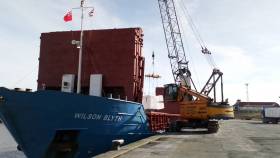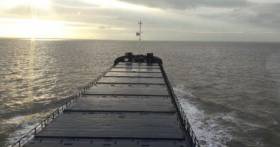Displaying items by tag: Port of Silloth
Irish Sea Port of Silloth Handles Wood-Pulp from South America for New Japanese Customer
#ports - The Irish Sea Port of Silloth operated by Associated British Ports (ABP) has handled the first delivery of wood pulp for its new Japanese customer.
According to ABP, the Futamura Group manufacture cellulose and polymeric films for the packaging industry who have a major production site in Cumbria where the north-west English port is located.
Wilson Blyth (see Dun Laoghaire call) delivered the 2,500 tonne wood pulp to Silloth, having loaded the import in South America. The cargo will be transported to the company’s production site in Wigton, Cumbria, which employs around 270 people. The wood pulp will be used to make packaging films for foodstuffs such as sweets, tea, coffee and snack products.
Carl Bevan, ABP Divisional Port Manager – North West, said: “We’re delighted to welcome Futamura Group as a new customer at our Port of Silloth and look forward to working together to support a prosperous future for the Cumbrian economy.”
Tom Ismay, Procurement Manager at Furtamura, said: “It has been a very smooth transition working with ABP and we are glad that our local infrastructure means we can easily bring goods in via such a convenient port. One bulk ship has taken approximately 200 lorry loads off the road. Sustainability is important to Futamura and we are working hard to make changes where we can."
Record Breaking Year At Irish Sea Port of Silloth
#ports - According to Associated British Ports (ABP) which operates the Port of Silloth on the Irish Sea, has celebrated a record-breaking year in 2018 by handling the highest cargo volumes since 2015.
This year the north-west English port handled a total of around 156,000 tonnes of cargo, representing nearly a 20% growth in tonnage volumes since 2017.
In addition, in December, the vessel ‘Blue Six’ (pictured above) carried more than 3,700 tonnes of French wheat became the fifth largest delivery to enter the port since official records began in the 19th century. The wheat was processed at Carr’s Flour Mill, a thriving business and important local employer, founded more than 180 years ago.
The top spot for Silloth’s largest cargo delivery is still held by the ‘Arklow Venture’ (see launch) which transported over 4,200 tonnes of bulk fertiliser from Antwerp to Silloth in March 2014.
Carl Bevan, ABP Divisional Port Manager – North West, said: “We are pleased to report that the Port of Silloth has had an excellent year, handling 58 piloted ships and exceeding expectations thanks to the positive performance of our customers and colleagues.”
“We also opened our new ground-mounted solar farm in May 2018 which allows ABP Port of Silloth to generate more electricity than it consumes with all surplus green electricity being exported to the National Grid.”

























































